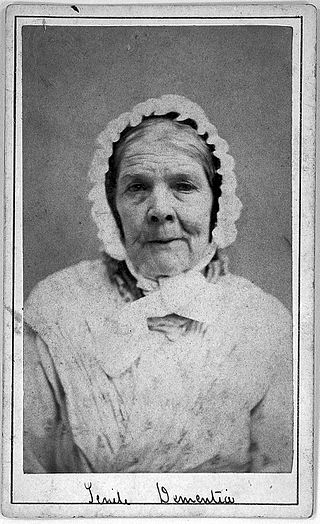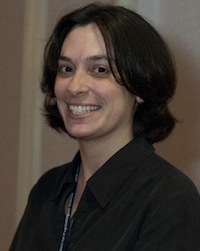
Cognition is the "mental action or process of acquiring knowledge and understanding through thought, experience, and the senses". It encompasses all aspects of intellectual functions and processes such as: perception, attention, thought, imagination, intelligence, the formation of knowledge, memory and working memory, judgment and evaluation, reasoning and computation, problem-solving and decision-making, comprehension and production of language. Cognitive processes use existing knowledge and discover new knowledge.

Dementia with Lewy bodies (DLB) is a type of dementia characterized by changes in sleep, behavior, cognition, movement, and regulation of automatic bodily functions. Memory loss is not always an early symptom. The disease worsens over time and is usually diagnosed when cognitive impairment interferes with normal daily functioning. Together with Parkinson's disease dementia, DLB is one of the two Lewy body dementias. It is a common form of dementia, but the prevalence is not known accurately and many diagnoses are missed. The disease was first described by Kenji Kosaka in 1976.
Ellen Bialystok, OC, FRSC is a Canadian psychologist and professor. She carries the rank of Distinguished Research Professor at York University in Toronto, Ontario where she is director of the Lifespan Cognition and Development Lab. She is also an associate scientist at the Rotman Research Institute of the Baycrest Centre for Geriatric Care.
Memory disorders are the result of damage to neuroanatomical structures that hinders the storage, retention and recollection of memories. Memory disorders can be progressive, including Alzheimer's disease, or they can be immediate including disorders resulting from head injury.
Music psychology, or the psychology of music, may be regarded as a branch of both psychology and musicology. It aims to explain and understand musical behaviour and experience, including the processes through which music is perceived, created, responded to, and incorporated into everyday life. Modern music psychology is primarily empirical; its knowledge tends to advance on the basis of interpretations of data collected by systematic observation of and interaction with human participants. Music psychology is a field of research with practical relevance for many areas, including music performance, composition, education, criticism, and therapy, as well as investigations of human attitude, skill, performance, intelligence, creativity, and social behavior.

Age-related memory loss, sometimes described as "normal aging", is qualitatively different from memory loss associated with types of dementia such as Alzheimer's disease, and is believed to have a different brain mechanism.

Nancy Gail Kanwisher FBA is the Walter A Rosenblith Professor of Cognitive Neuroscience in the Department of Brain and Cognitive Sciences at the Massachusetts Institute of Technology and an investigator at the McGovern Institute for Brain Research. She studies the neural and cognitive mechanisms underlying human visual perception and cognition.
Judith F. Kroll is a Distinguished Professor of Language Science at University of California, Irvine. She specializes in psycholinguistics, focusing on second language acquisition and bilingual language processing. With Randi Martin and Suparna Rajaram, Kroll co-founded the organization Women in Cognitive Science in 2001. She is a Fellow of the American Association for the Advancement of Science (AAAS), the American Psychological Association (APA), the Psychonomic Society, the Society of Experimental Psychologists, and the Association for Psychological Science (APS).

Sandra Bond Chapman is a cognitive neuroscientist, founder and chief director of the Center for Brain Health, Dee Wyly Distinguished Professor in Brain Health, and a professor in the School of Behavioral and Brain Sciences at The University of Texas at Dallas.
Mark A. Gluck is a professor of neuroscience at Rutgers–Newark in New Jersey, director of the Rutgers Memory Disorders Project, and publisher of the public health newsletter, Memory Loss and the Brain. He works at the interface between neuroscience, psychology, and computer science, studying the neural bases of learning and memory. He is the co-author of Gateway to Memory: An Introduction to Neural Network Models of the Hippocampus and an undergraduate textbook Learning and Memory: From Brain to Behavior.

Carol A. Barnes is an American neuroscientist who is a Regents' Professor of psychology at the University of Arizona. Since 2006, she has been the Evelyn F. McKnight Chair for Learning and Memory in Aging and is director of the Evelyn F. McKnight Brain Institute. Barnes has been president of the Society for Neuroscience and is a Fellow of the American Association for the Advancement of Science, and foreign member of the Royal Norwegian Society of Sciences and Letters. She was elected to the National Academy of Sciences in 2018.
Center for Vital Longevity (CVL) is a research center of the University of Texas at Dallas. CVL houses scientists studying the cognitive neuroscience of aging and ways to maintain cognitive health for life. Researchers at the CVL also investigate how to slow cognitive aging and methods for the early detection of age-related neurodegenerative disorders, such as Alzheimer's disease. Other research includes studies investigating the cognitive neuroscience of memory, and other fundamental cognitive processes.

Rosalind Ridley is a British psychologist and researcher who was head of the Medical Research Council Comparative Cognition Research Team in the Department of Psychology, Cambridge, UK, until 2005. She was a fellow of Newnham College, Cambridge from 1995–2010 and Vice-Principal from 2000–2005. She holds the privileges of a Fellow Emerita at Newnham College.

Sharon Thompson-Schill is the Christopher H. Browne Distinguished Professor of Psychology at the University of Pennsylvania in Philadelphia, Pennsylvania. Her research covers the field of biological basis of human cognitive systems, including language, memory, perception, and cognitive control, and the relationships between these systems. As of 2023, she has produced more than 190 scientific publications, which collectively have been cited over 18,000 times.
Cyma Kathryn Van Petten is an American cognitive neuroscientist known for electrophysiological studies of language, memory, and cognition. She is Professor of Psychology at the State University of New York at Binghamton where she directs the Event-Related Potential Lab. Van Petten was recipient of the Early Career Award from the Society for Psychophysiological Research in 1994.
Maria Natashini "Natasha" Rajah is a Canadian neuroscientist who is a Full Professor at the Department of Psychology, Toronto Metropolitan University. Prior to joining Toronto Metropolitan University in August 2023, she was Full Professor at the Department of Psychiatry at McGill University from 2005 to July 2023, and was the inaugural Scientific Director of the Cerebral Imaging Center (CIC) at the Douglas Research Centre from 2011 to 2021. She is a cognitive neuroscientist who is interested in episodic memory, ageing and dementia. Her research uses functional magnetic resonance imaging to investigate how sex, gender, and social determinants of health interact with age and affect the neural networks responsible for episodic memory encoding and retrieval.

Qi Wang is a Chinese-born American psychologist and Professor of Human Development at Cornell University. She is best known for her study of memory and culture. Wang is a Fellow of the Association for Psychological Science and the Psychonomic Society. She is also a member of the American Psychological Association, the Society for Research in Child Development, the Cognitive Development Society, the International Society for the Study of Behavioral Development, and the Society for Applied Research in Memory and Cognition. She serves on many editorial boards and is the Editor-in-Chief of the Journal of Applied Research in Memory and Cognition. She directs the Culture & Cognition Lab at Cornell. Wang holds a lifetime endowed chair in human development at Cornell.
Lola L. Cuddy is a Canadian psychologist recognized for her contributions to the field of music psychology. She is a professor emerita in the Department of Psychology at Queen's University in Kingston, Ontario.
Patricia Ann Reuter-Lorenz is an American psychologist who is the Michael I. Posner Collegiate Professor of Psychology and Neuroscience at the University of Michigan. Reuter-Lorenz is Chair of the School of Psychology and researches the cognitive mechanisms of attention. She was elected Fellow of the American Association for the Advancement of Science.








